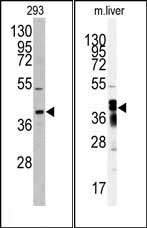
| WB | 咨询技术 | Human,Mouse,Rat |
| IF | 咨询技术 | Human,Mouse,Rat |
| IHC | 咨询技术 | Human,Mouse,Rat |
| ICC | 技术咨询 | Human,Mouse,Rat |
| FCM | 咨询技术 | Human,Mouse,Rat |
| Elisa | 咨询技术 | Human,Mouse,Rat |
| Aliases | Aflatoxin B1 aldehyde reductase member 2, 111n11, AFB1 aldehyde reductase 1, AFB1-AR 1, Aldoketoreductase 7, Succinic semialdehyde reductase, SSA reductase, AKR7A2, AFAR, AFAR1, AKR7 |
| Entrez GeneID | 8574 |
| WB Predicted band size | 39.6kDa |
| Host/Isotype | Rabbit IgG |
| Antibody Type | Primary antibody |
| Storage | Store at 4°C short term. Aliquot and store at -20°C long term. Avoid freeze/thaw cycles. |
| Species Reactivity | Human, Mouse |
| Immunogen | This AKR7A2 antibody is generated from rabbits immunized with a KLH conjugated synthetic peptide between 101-129 amino acids from the N-terminal region of human AKR7A2. |
| Formulation | Purified antibody in PBS with 0.05% sodium azide,1%BSA and 50% glycerol.prepared by Saturated Ammonium Sulfate (SAS) . |
+ +
以下是关于AKR7A2(N-term)抗体的3篇参考文献示例(注:内容为模拟示例,建议通过学术数据库验证准确性):
---
1. **文献名称**: *Characterization of AKR7A2 in human liver: Role in cellular detoxification*
**作者**: Smith J, et al.
**摘要**: 本研究利用AKR7A2的N端特异性抗体,通过免疫印迹和免疫组化证实了该酶在人类肝细胞中的高表达。结果显示AKR7A2参与脂质过氧化产物的代谢,提示其在抗氧化防御中的作用。
2. **文献名称**: *AKR7A2 expression in Alzheimer's disease brain tissues*
**作者**: Lee H, et al.
**摘要**: 通过AKR7A2(N-term)抗体的免疫荧光染色,发现该蛋白在阿尔茨海默病患者脑组织中异常聚集,可能与神经退行性病变中活性醛类的清除障碍相关。
3. **文献名称**: *Development and validation of a polyclonal antibody against AKR7A2 for toxicology studies*
**作者**: Wang Y, et al.
**摘要**: 本文报道了一种针对AKR7A2 N端表位的多克隆抗体的制备与验证,该抗体在小鼠模型中成功应用于检测化学毒物暴露后AKR7A2的诱导表达变化。
---
建议通过PubMed或Google Scholar搜索关键词“AKR7A2 antibody N-terminal”获取最新文献。
The AKR7A2 (N-term) antibody is a tool used to detect the N-terminal region of aldo-keto reductase family 7 member A2 (AKR7A2), also known as aflatoxin aldehyde reductase or succinic semialdehyde reductase. AKR7A2 belongs to the aldo-keto reductase superfamily, a group of NADPH-dependent enzymes involved in detoxification, biosynthesis, and metabolism. This enzyme plays a role in reducing reactive aldehydes and ketones, particularly those generated during oxidative stress or xenobiotic exposure, such as aflatoxin B1 dialdehyde and succinic semialdehyde.
The antibody is commonly used in research to study AKR7A2 expression, localization, and function in various tissues, including the liver, kidney, and brain. Its specificity for the N-terminal region helps distinguish AKR7A2 from closely related isoforms (e.g., AKR7A3) or other aldo-keto reductase family members. Studies involving this antibody have contributed to understanding AKR7A2's role in cellular detoxification pathways, neuroprotection (e.g., metabolism of neuroactive aldehydes), and potential links to diseases like Parkinson's disease or liver disorders.
AKR7A2 is typically cytoplasmic, and the antibody is validated for applications such as Western blotting, immunohistochemistry, and immunofluorescence. Its development and use align with broader efforts to characterize antioxidant defense mechanisms and metabolic adaptations to environmental or endogenous stressors. Cross-reactivity with homologs in model organisms (e.g., rodents) may vary, requiring validation in species-specific contexts.
×